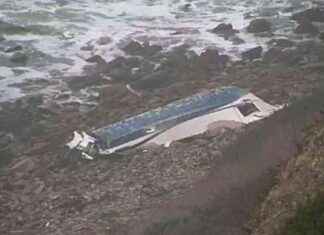The United States confirmed having carried out a new strike against Houthi sites in Yemen on the night of Friday January 12 to Saturday January 13, the day after the first American and British bombings against this movement accused of threatening international maritime traffic in the Red Sea. The United States Central Military Command (Centcom) confirmed a strike around 3:45 a.m. local time Saturday “against a radar site in Yemen.” Yemeni rebel media earlier reported new strikes targeting at least one site in the capital, Sanaa.
The US-British strikes on Friday morning were in response to an increase in attacks on commercial ships in the Red Sea by Yemeni rebels. Thirty Houthi military sites were targeted in the night from Thursday to Friday by more than 150 strikes, announced General Douglas Sims of the American General Staff.
For his part, the Houthi military spokesperson said that Friday’s strikes had hit Sanaa and the governorates of Hodeida (west), Taiz (south), Hajjah (northwest) and Saada (north).
These bombings have revived fears of a regional spillover of the war in Gaza. Supported by Iran, the Houthis say they are acting in solidarity with the Palestinians in the Gaza Strip, where Israel is waging a war against Hamas.
The United Kingdom, which deployed three ships in the region, defended the legality of its strikes on Friday, repeating that it had acted in a situation of “self-defense”. These actions are “necessary, legal and proportionate”, insisted the head of British diplomacy, David Cameron, in a video published on X.
In a joint statement, Washington, London and eight of their allies including Australia, Canada and Bahrain stressed that their objective was “de-escalation” in the Red Sea. NATO called on the Houthis to stop their attacks after these “defensive” strikes.
“All US-UK interests are legitimate targets”
“In response” to these first strikes, the Houthis fired an anti-ship missile on Friday evening, General Douglas Sims said, specifying that no boat had been hit. “All American-British interests have become legitimate targets for the Yemeni armed forces after the direct and declared aggression” against Yemen, the Supreme Political Council of the Houthis, a high authority of the rebels, threatened in a press release on Friday. “This aggression (…) will not go unanswered,” said the Houthi spokesperson, declaring that five people had been killed and six injured among the rebels.
American President Joe Biden, for his part, affirmed on Friday after the first strikes that they had caused no “civilian casualties”. He warned that he would “respond” if “the Houthis continue their unacceptable behavior.” Asked about the message he wanted to deliver to Iran, which supports the Houthis, the American president replied: “I have already sent my message to Iran. »
The Houthi movement is part of the “axis of resistance” established by Tehran, which brings together groups hostile to Israel in the region, including Lebanese Hezbollah and armed groups in Iraq and Syria.
Iran denounced on Friday a “blatant violation of the sovereignty” of Yemen. In a statement, the Islamic Republic’s foreign ministry spokesman Nasser Kanani “strongly condemned” the strikes.
For its part, Russia denounced at the UN on Friday a “blatant aggression” and a “massive strike” on “the territory of Yemen”, while Turkish President Recep Tayyip Erdogan worried about a response “disproportionate.”
The operation will have “repercussions on regional security,” responded Hamas. The Sultanate of Oman, mediator between Houthis and loyalist forces in the civil war in Yemen, denounced the “resort of friendly countries to military action”. China, for its part, called on the parties “to exercise restraint.”
UN calls to avoid “escalation”
A call for calm was also launched by Saudi Arabia, a country at the head of an anti-Houthi military coalition intervening alongside the government since 2015 in the civil war in Yemen, which has experienced a lull since a truce negotiated in April 2022 by the United Nations.
UN Secretary-General Antonio Guterres called on “all parties concerned to avoid an escalation of the situation in the interest of peace and stability in the Red Sea and the entire region. », through the voice of its spokesperson, Stéphane Dujarric.
“The Secretary-General reaffirms that attacks on international shipping in the Red Sea are unacceptable, jeopardize the safety and security of global supply chains and have a negative impact on the economic and humanitarian situation in the whole world,” the spokesperson added.
The Security Council adopted a resolution on Wednesday demanding an “immediate” end to Houthi attacks on ships in the Red Sea, also noting the right of member states to defend ships against such attacks.





